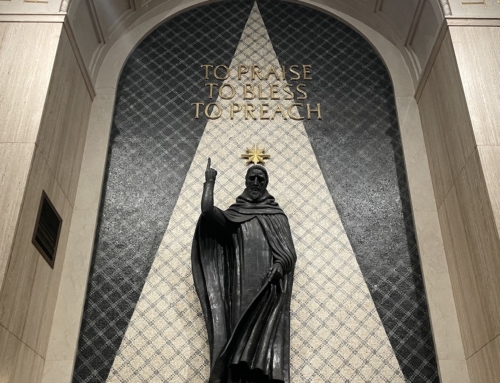What does it mean to say that “God is truth?” I recently read a brief explanation of this in one installment of a “read the catechism in a year email campaign” from flocknote.com, and it left me still questioning what exactly the statement means. Part of the explanation was that “’God is light and in him is no darkness.’ His Word is truth, and his Law is truth.” A few lines later it also said, “We know that God is truth on the basis of the absolute credibility of Jesus. He is ‘the way, and the truth, and the life….’ If God were not ‘true’, then faith and reason could not have a dialogue with each other. An agreement is possible, however, because God is truth, and the truth is divine.” To reach a fuller answer, we can look at what truth itself is.
Truth is a relation between a mind and some being outside the mind. It is the conformity of the mind with this “extra-mental” reality. Normally, when we speak of something as being true, we mean that our mind is conformed to or matches what is outside it. That is, we correctly perceive and understand some other being. When we speak of God, however, it would sound a bit odd to say that He is “the conformity of mind with being.” This is where a distinction comes in handy. We distinguish the way we talk about God from the way we talk about the world around us. Words that we apply both to God and to things are used in an analogous fashion rather than in exactly the same way. When we say that God is truth, it does not mean that God’s intellect becomes conformed to other beings, but rather that all beings are conformed to Him. Everything is made and ordered according to the existence that it has according to its respective “divine idea” in the intellect of God. God is Existence itself, and all other beings participate in His existence.
God knows most intimately everything, visible and invisible, that exists. There is no darkness, no lack of comprehension of reality in Him. As the source and sustainer of all that is, He cannot possibly be wrong about anything. His knowledge is reality. God’s law is truth because it is a rule or measure arising from His reason, and it directs man to his supernatural end. The divine law, in other words, directs us to what completes and perfects us, and so is conformed to the idea God has of us. Since faith and right reason both lead us to the source of our existence, God must be “true” for faith and reason to “have a dialogue.”
All men by nature desire to know, as Aristotle says. Being, under the aspect of truth, is the proper object of the intellect. We want to know the things around us. Through reason we can know that there is an ultimate source of being as well as something of His nature. By faith we know who He is. Faith and reason, then, seek the same Being, but in different ways. If God were not “true,” not the source of all being, then faith and reason would be seeking totally different things and so would not be able to be in dialogue with each other. We would then be divided within ourselves, pulled in one direction by faith and in another direction by reason. Furthermore, an anti-rational faith and an anti-supernatural reason would be each the poorer for not embracing the unity of truth in God. Who could be happy being fragmented and conflicted in such a manner?
✠
Image: Salvator Rosa, Democritus in Meditation







